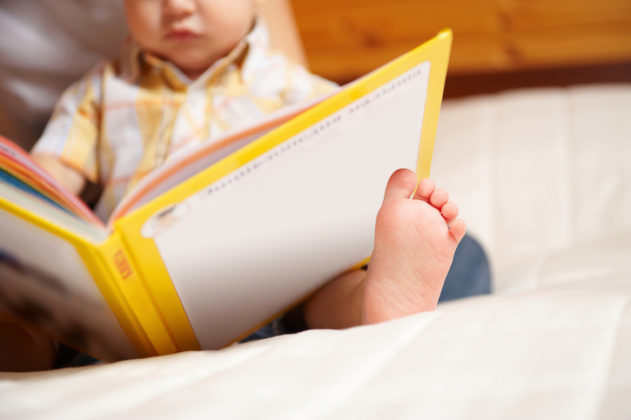As a queer parent with a donor-conceived child, the market of books with families that look like mine is awfully small.
When I found a copy of Horton Hatches the Egg at the library with my daughter, I remembered it vaguely as a cute story from my childhood about a bird and an elephant. I reached for it out of a combination of nostalgia and the knowledge that rhyming text sometimes quells my toddler’s destructive tendencies. But as I read it, sitting cross-legged on the carpet with my daughter pulling all the board books off the shelves, I was startled to find that the ending of the classic Dr. Seuss tale brought tears to my eyes.
In case it’s been a while for you, too, Horton is the story of an elephant who gets sweet-talked into sitting on a bird named Mayzie’s egg while Mayzie goes on vacation. Through trials and tribulations, he refuses to abandon the egg, repeating over and over, “I meant what I said and I said what I meant. An elephant’s faithful, one hundred percent.”
When the egg hatches, Horton sees that through some combination of devotion and osmosis, the baby bird inside has become an “elephant-bird,” with “ears and a tail and a trunk just like his.” The sheer amount of time he’s put into protecting the egg has made it look like him, and the elephant-bird goes to live with him in the jungle.
Horton isn’t as openly didactic as some of Seuss’s books, like The Sneetches or The Butter Battle Book. You can read it a hundred times without noticing its thematic underpinning, the way I did when I was little. But when I read it for the first time as an adult, it clicked into place: This is a story about bonding with a child who isn’t biologically yours.
Like Horton, I am a non-gestational parent. Genetically, my daughter is one-half my partner and one-half an anonymous donor whom I wouldn’t know if I passed him on the street. She did not hatch from my egg. But just like Horton, I’m devoted to her with my whole heart. Just like Horton, I would face down storms and hunters and interminable journeys to make sure my child is safe.
My daughter doesn’t look like me, although sometimes people comment that she does – I think because we’re both white and have blue eyes. She won’t carry my family’s potential for colorblindness or, I hope, need braces as desperately as my siblings and I all did. There are times when she looks very clearly like my partner, and other times when she looks like someone entirely unfamiliar, unprecedented. It’s strange to contemplate the fact that this child I’ve known since the very moment she first existed is not, in any biological sense, mine.
But in so many other ways, in all the ways that matter, she is truly and unshakably connected to me. The bond I feel with her is no less primal than the one she has with my partner, who gave birth to her. I have wanted her and planned for her and protected her, cleaned up after her and held her hand, sung her lullabies in utero and taught her new words. And I see myself in her, see the indelible ways I have shaped her by being part of her life every day. I wonder if this is what people see when they say she looks like me. There are echoes of myself in her voice, her intonation, in her facial expressions, and the way she dances.
What makes a family? Some people will tell you it’s DNA, but to the parent of an adopted or donor-conceived child, it’s time and dedication, making promises and keeping them, showing up day after day no matter how it rains or snows or thunders. It’s staying where you are when people point and laugh, like they do at Horton the elephant sitting on a bird’s nest. That commitment is what turns the bird in the egg into an elephant-bird, what turns Horton into a parent, what makes them into a family.
This is what makes Horton Hatches the Egg special: It’s not just a portrait of a family, but a story about how they came to be a family. It’s not a Very Important Lesson book; the message, if there is one, takes a backseat to the plot. As a queer parent with a donor-conceived child (or a “science baby,” as my friend likes to say), the market of books with families that look like mine is awfully small. I want books to show my daughter some reflection of herself and her family in the world, but I cringe away from anything that feels preachy or objectifying. I don’t want to read my daughter Heather Has Two Mommies. I want to read her Heather And Her Two Mommies Have Awesome Adventures in Space, or something to that effect. Traditional families in fiction get to do things – their very existence isn’t considered remarkable enough to constitute a story. That’s the kind of representation I want our daughter to see.
There aren’t a lot of books like that out there, but at least there’s Horton. And I’ll keep reading it to my child and any siblings she might have in the future, to remind them that no matter our biological connection, we’ll always be a family – one hundred percent.
Lindsay King-Miller is a queer femme who does not have an indoor voice. Her writing has appeared in Bitch Magazine, Cosmopolitan.com, Buzzfeed, The Hairpin, and numerous other publications. She lives in Denver with her partner, a really cute baby, and two very spoiled cats. She is the author of Ask A Queer Chick (Plume, 2016).
Other Links:

